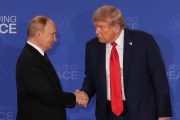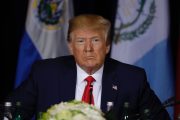Senator Rand Paul (R-Ky.) said when he heard of President Trump’s decision to pull American forces out of Syria that he was “happy to see a President who can declare victory and bring our troops out of a war. It’s been a long time since that has happened.” The entire force of better than 2,000 American military personnel will be removed as quickly as possible, the Trump administration announced Wednesday.
The “victory” declared by President Trump was against the Islamic State, often referred to as ISIS. Significantly, Trump did not include regime change, with the goal of ousting Syrian President Bashar al-Assad from power, as any part of the American military deployment in the country, declaring the defeat of ISIS as “my only reason for being there during the Trump presidency.”
White House Press Secretary Sarah Huckabee Sanders explained the move in a statement, saying that the United States had defeated the Islamic “caliphate” in Syria. “We have started returning United States troops home as we transition to the next phase of this campaign. The United States and our allies stand ready to re-engage at all levels to defend American interests whenever necessary.”
Opponents of Trump’s move raised concerns that withdrawal could lead to a resurgence of the militant ISIS. Nicholas Heras of the Center for a New American Security said, “The decision, even before ISIS is defeated on the battlefield, is tempting a massive resurgence of ISIS by the end of this year.” It also appeared to contradict the message of Trump’s secretary of defense, Jim “Mad Dog” Mattis, who told reporters as recently as September, “Getting rid of the caliphate doesn’t mean you then blindly say okay, we got rid of it, march out, and then wonder why the caliphate comes back.”
Senator Lindsey Graham (R-S.C.), who has recently been quite supportive of much of the Trump agenda, shared the view of Mattis, after the withdrawal was announced Wednesday morning, calling it “a huge Obama-like mistake.” Former President Barack Obama initially dismissed ISIS as a serious threat in the Middle East, derisively referring to it as “the JV team.”
John Bolton, Trump’s national security advisor, had vowed at the UN General Assembly in September that the United States was “not going to leave as long as Iranian troops are outside Iranian borders, and that includes Iranian proxies and militias.”
Exactly how long after ISIS is defeated American troops should stay in a foreign nation, without any authorization by Congress and without the permission of the Syrian government, has not been detailed by Heras, Mattis, Graham, and Bolton. But Trump was wildly applauded by many of this same crowd when he was persuaded by his advisors — including his own daughter, Ivanka — to bomb Syrian targets last year in response to allegations that the Assad government had used chemical weapons in the Syrian civil war.
This is because, to many of the foreign-policy establishment, while the official purpose of American involvement in Syria may have been to defeat ISIS, the removal of Syrian President Bashar al-Assad from power has also been a long-standing goal. In other words, conflicts such as that occurring in Syria are often used as a pretext to increase the power of international organizations, particularly the United Nations. UN resolutions have called for a new constitution and new elections in Syria, and the foreign policy establishment sees America as the principal enforcer of such resolutions.
But the UN charter specifically forbids interference in a nation’s domestic affairs. Article 15(8) of the Covenant of the League of Nations, Article 2(7) was inserted in the United Nations Charter to limit the authority of the organization in respect to disputes that are essentially within the domestic jurisdiction of the member states. Of course, much like the disrespect given to following the U.S. Constitution whenever it inhibits what progressives want to do, such provisions found in the UN charter that ostensibly limited UN jurisdiction are likewise ignored when they inhibit the goals of globalist-minded politicians in the United States and in other countries.
According to Gideon Rose, in the January/February edition of the globalist Council on Foreign Relations’ bi-monthly publication Foreign Affairs, “regime change” in nations that “could not be trusted to participate in [the] collective security system” has been a principle of those advocating for a New World Order from the days of one of its principal advocates, Woodrow Wilson. One could even argue that this group is attempting “regime change” in the United States, right now.
Hopefully, President Trump will resist efforts by this crowd to practice “regime change” in Syria, or elsewhere.
Image: btgbtg via iStock / Getty Images Plus





